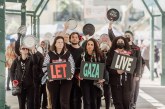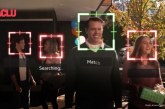I had originally put this in a comment, I’ll throw it as it’s own entry and follow-up with some thoughts on it…
One thing that the Davis Police recognize is that the majority of the crime committed in
Part of this is good police work–understanding where the crime is going to come from is very important. On the other hand, the people who may “look like they don’t belong here” simply because they are not in the majority are most often minorities who live in
The key questions that are asked during the stops are things such as, “are you from
In the end, profiling is hard to prove. There are some aspects of good police work here, but the practice ends up angering many people who fall into the target group that the police believe may not belong. In the end, they are looking for reasons to pull over minorities and question them. It may or may not be an effective crime fighting technique, but it also serves to drive a wedge into the minority community.
The rest of the community really has no conception for the amount of anger that is out there. Last May, I attended a march at the police station with a number of students–almost all of them were minority students and the vast majority of those were African-American. I’ve followed this issue for quite some time and yet I was caught off guard by the sheer number of students who stepped forward and the level of anger that they had at how they were treated.
I would say more than 20 students spoke about personal experiences with the police and racial profiling and some of them had more than a handful of these experiences. It was shocking to listen to this, because it was clearly a very different world that they inhabit from those of us who are white. So when I heard comments from people in this community last spring talking about the fact that they’ve never had a negative experience with the police, the first thought that jumps into my head is that they are older and white rather than younger and a minority. That gulf made it very difficult for much of the community who has undoubtedly had good experiences with the police to understand where this anger was coming from. That polarization led to many of the problems that occurred in the past year.
The number of times many of these students had been pulled over leads one to the stark conclusion that this is not merely the enforcement of minor violations as some police officers claim. It is systematic and it is very intrusive.
But the issue of racial profiling itself remains a very tricky situation to try to deal with. It is difficult to prove because the encounters are often ambiguous and it is only in the broader context that it becomes apparent that there is a problem. That’s been the problem all along–the City Council and the previous police chief denied that there was any problem whatsoever (while at the same time they implemented tremendous amounts of change by creating the position of ombudsman) and the majority of the community agreed with them because they never experienced the problems that some of our residents and our students have had to experience.
There is little that the Ombudsman can do about racial profiling–most cases will be murky at best. A police officer pulls over an African-American UC Davis student, says that he has failed to signal–how is even a video going to demonstrate conclusively otherwise? We would need data on traffic stops and that data would have to somehow demonstrate that a disproportionate amount of African American students were getting pulled over for minor incidents with no citation given.
Amazingly enough there was some data collected at one point by the police department. However, last year Steve Pierce, then Assistant Chief, admitted that they didn’t know what to do with it and they threw it out when they moved to the new police station. He admitted this at a public meeting and wrote it in an email to Chief Hyde.
Unfortunately, while I have hope for the new ombudsman and his ability to investigate some of the complaints into the police department, racial profiling is going to be a tough nut to crack. I just don’t see that issue getting resolved anytime soon. Clearly the community needs to see what is going on before they are going to be willing to act and I don’t see how that’s going to happen either.
—Doug Paul Davis reporting






Dare I suggest that UC Davis students put something on their car that identifies them as a Davis citizen? My car has a parking permit sticker that would identify what neighborhood I live in. Maybe a UC Davis decal in the back window might help. Or a bumper sticker about purely a local issue. I’m sure that there are plenty of No on X bumper stickers still around. Pardon me if I’m being insensitive, but there must be a way for these kids to avoid being pulled over again and again, and the police being able to battle the auto/home break ins that are rampant in town.
Dare I suggest that UC Davis students put something on their car that identifies them as a Davis citizen? My car has a parking permit sticker that would identify what neighborhood I live in. Maybe a UC Davis decal in the back window might help. Or a bumper sticker about purely a local issue. I’m sure that there are plenty of No on X bumper stickers still around. Pardon me if I’m being insensitive, but there must be a way for these kids to avoid being pulled over again and again, and the police being able to battle the auto/home break ins that are rampant in town.
Dare I suggest that UC Davis students put something on their car that identifies them as a Davis citizen? My car has a parking permit sticker that would identify what neighborhood I live in. Maybe a UC Davis decal in the back window might help. Or a bumper sticker about purely a local issue. I’m sure that there are plenty of No on X bumper stickers still around. Pardon me if I’m being insensitive, but there must be a way for these kids to avoid being pulled over again and again, and the police being able to battle the auto/home break ins that are rampant in town.
Dare I suggest that UC Davis students put something on their car that identifies them as a Davis citizen? My car has a parking permit sticker that would identify what neighborhood I live in. Maybe a UC Davis decal in the back window might help. Or a bumper sticker about purely a local issue. I’m sure that there are plenty of No on X bumper stickers still around. Pardon me if I’m being insensitive, but there must be a way for these kids to avoid being pulled over again and again, and the police being able to battle the auto/home break ins that are rampant in town.
While I sympathize with the idea, I think it over-simplifies the problem. Are the police using the “outsider” as an excuse or an explanation for pulling people over? And would a bumpersticker really convince the police that those people are from Davis and do not represent a threat? I have my doubts.
And of course then there’s the nagging bottom line for me: is that the community that we want to live in?
While I sympathize with the idea, I think it over-simplifies the problem. Are the police using the “outsider” as an excuse or an explanation for pulling people over? And would a bumpersticker really convince the police that those people are from Davis and do not represent a threat? I have my doubts.
And of course then there’s the nagging bottom line for me: is that the community that we want to live in?
While I sympathize with the idea, I think it over-simplifies the problem. Are the police using the “outsider” as an excuse or an explanation for pulling people over? And would a bumpersticker really convince the police that those people are from Davis and do not represent a threat? I have my doubts.
And of course then there’s the nagging bottom line for me: is that the community that we want to live in?
While I sympathize with the idea, I think it over-simplifies the problem. Are the police using the “outsider” as an excuse or an explanation for pulling people over? And would a bumpersticker really convince the police that those people are from Davis and do not represent a threat? I have my doubts.
And of course then there’s the nagging bottom line for me: is that the community that we want to live in?
Perhaps the DPD should patrol the streets where the crimes happen rather than harassing mostly innocent people near the border of the city. I would also suggest that if they actually see a crime happening they should consider doing something about it. In other words the DPD should try to act like normal police departments act – they should try to perform the duties they are being paid to do.
Perhaps the DPD should patrol the streets where the crimes happen rather than harassing mostly innocent people near the border of the city. I would also suggest that if they actually see a crime happening they should consider doing something about it. In other words the DPD should try to act like normal police departments act – they should try to perform the duties they are being paid to do.
Perhaps the DPD should patrol the streets where the crimes happen rather than harassing mostly innocent people near the border of the city. I would also suggest that if they actually see a crime happening they should consider doing something about it. In other words the DPD should try to act like normal police departments act – they should try to perform the duties they are being paid to do.
Perhaps the DPD should patrol the streets where the crimes happen rather than harassing mostly innocent people near the border of the city. I would also suggest that if they actually see a crime happening they should consider doing something about it. In other words the DPD should try to act like normal police departments act – they should try to perform the duties they are being paid to do.